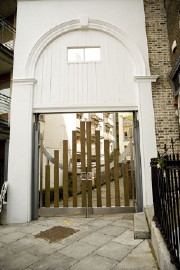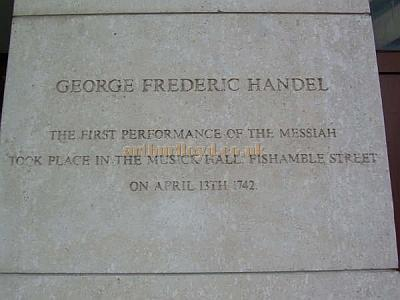On This Day in Church History – April 13th
At twelve noon on this day in 1742, the world first heard the lovely strains of the overture of the most famous oratorio ever written. There has not been a year since then that George Frederick Handel’s Messiah, with its memorable arias and majestic choruses, has not been performed in a concert hall somewhere.
The performance took place in Dublin, in the Fishamble Street Musick Hall (Original spelling – entrance today pictured at right). Dubliners received it with enthusiasm. The Dublin Gazette wrote, “The best judges allowed it to be the most finished piece of music,” and “Words are wanting to express the exquisite delight it afforded.” Two years later, annual performances were established in Dublin. London, however, did not receive the oratorio as readily. Because of criticism, it did not catch on in the capital until 1749.
pictured at right). Dubliners received it with enthusiasm. The Dublin Gazette wrote, “The best judges allowed it to be the most finished piece of music,” and “Words are wanting to express the exquisite delight it afforded.” Two years later, annual performances were established in Dublin. London, however, did not receive the oratorio as readily. Because of criticism, it did not catch on in the capital until 1749.
Handel had turned to oratorios, most of them on religious themes, only after he could not make go of opera with his English audiences. Messiah was special even within the genre of oratorio. Handel deliberately wrote it so that it could be performed by as few as four singers with strings, continuo (bass line played by keyboard or stringed instrument), two drums and two trumpets.
The idea was to produce a work that could be staged almost anywhere. This was a great boon to Handel, who was often near destitution. A piece like Messiah, which could be performed by small ensembles, offered more than the usual number of opportunities to raise desperately needed cash.
Charles Jennens pulled together the text of Messiah from fragments of Scripture relating to Christ. The power of the Scriptures comes by laying them forth almost as translated (he used more than one translation where it suited his purpose), joining them so that they built on and clarified one another without comment. Old and New Testament passages that belonged together were put side-by-side.
Where Jennens modified passages, he did so to make them scan better and to keep the texts in the third person throughout. Handel, who claimed to know the Bible as well as any bishop, made a few alterations himself. Jennens, a devout Anglican, intended through his lebretto to challenge the Deists, who denied Christ’s divinity: “And His name shall be called, Wonderful, Counselor, the Mighty God, the Everlasting Father, the Prince of Peace.”
He certainly succeeded in presenting the challenge, for Messiah portrays Christ as son of God, the fulfillment of prophecy, Savior of the world and coming King. John Newton (author of the hymn “Amazing Grace”), slaver turned Anglican clergyman, preached fifty sermons on the text. Although Newton preached his series as a rebuke to those who glorified the music to those who glorified the music above God’s Word, he said the piece covered all the principle truths of the gospel. That Jennens fused the words together without once backtracking or repeating a passage demonstrates a great deal of perfectionism.
Handel brought the whole to a magnificent completion, writing the work in twenty-three fervent days despite already suffered a stroke. The music often rises to great loveliness and power. Passion builds until the climactic Hallelujah chorus: “Hallelujah, Hallelujah, for the Lord God Omnipotent reigneth.” Of the chorus, Handel said in his broken English, “I did think I did see all heaven before me and the great God Himself!” [DPC – If only modern composers could say the same of their music!]
*Significant Events on April 13th in Church History:
799: Paulus Diaconis, a monk, died. Diaconis was called to Charlemagne’s court, where he complied a book of homilies from the Church fathers that received wide circulation throughout the empire. He prepared an accurate and useful history of the Lombards and wrote other historical works.
1055: Victor II, a reform-minded pope, was enthroned. Holy Roman Emperor Henry II opposed his friend’s election because he didn’t want to lose Victor as a counselor.
1059: In an attempt to normalize papal elections, Pope Nicholas II issued a decree limiting elections to cardinals.
1598: King Henry IV, whose mother, Jeanne d’ Albret, was a prominent French Protestant (Huguenot), issued an edict in Nantes granting toleration to the Huguenots.
1829: In an Emancipation Act, the English Parliament granted freedom of religion to Roman Catholics after 200 years of suppression. Within a few weeks, a Catholic was elected to Parliament.
1950: Monasteries and convents in Czechoslovakia were attacked by communists this night and their monks and nuns were carted off.
1986: Pope John Paul II visited a synagogue in Rome as a goodwill gesture toward Jews. His visit was the first recorded incident of a pope visiting a Jewish house of worship.
*Adapted from This Day In Christian History, edited by A Kenneth Curtis and Daniel Graves, Camp Hill, PA: Christian Publications.

